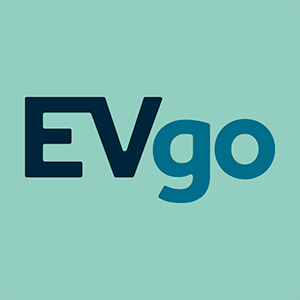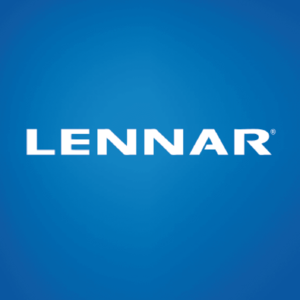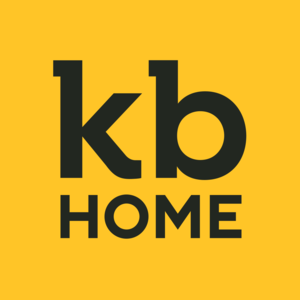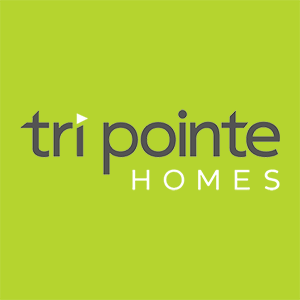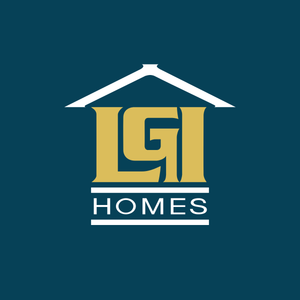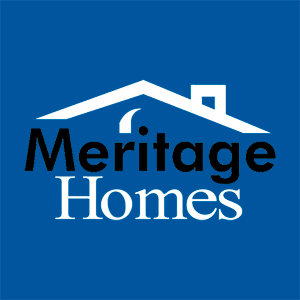
Meritage Homes (MTH)
Meritage Homes keeps us up at night. Its weak sales growth and declining returns on capital show its demand and profits are shrinking.― StockStory Analyst Team
1. News
2. Summary
Why We Think Meritage Homes Will Underperform
Originally founded in 1985 in Arizona as Monterey Homes, Meritage Homes (NYSE:MTH) is a homebuilder specializing in designing and constructing energy-efficient and single-family homes in the US.
- Sales tumbled by 2.3% annually over the last two years, showing market trends are working against its favor during this cycle
- Earnings per share have contracted by 19.3% annually over the last two years, a headwind for returns as stock prices often echo long-term EPS performance
- Projected sales decline of 1.5% over the next 12 months indicates demand will continue deteriorating


Meritage Homes falls short of our quality standards. There are better opportunities in the market.
Why There Are Better Opportunities Than Meritage Homes
High Quality
Investable
Underperform
Why There Are Better Opportunities Than Meritage Homes
At $72.08 per share, Meritage Homes trades at 12.3x forward P/E. This multiple is lower than most industrials companies, but for good reason.
Cheap stocks can look like a great deal at first glance, but they can be value traps. They often have less earnings power, meaning there is more reliance on a re-rating to generate good returns - an unlikely scenario for low-quality companies.
3. Meritage Homes (MTH) Research Report: Q4 CY2025 Update
Homebuilder Meritage Homes (NYSE:MTH) missed Wall Street’s revenue expectations in Q4 CY2025, with sales falling 11.5% year on year to $1.44 billion. Its non-GAAP profit of $1.20 per share was 21.2% below analysts’ consensus estimates.
Meritage Homes (MTH) Q4 CY2025 Highlights:
- Revenue: $1.44 billion vs analyst estimates of $1.49 billion (11.5% year-on-year decline, 3.8% miss)
- Adjusted EPS: $1.20 vs analyst expectations of $1.52 (21.2% miss)
- Adjusted EBITDA: $108.7 million vs analyst estimates of $151.2 million (7.6% margin, 28.1% miss)
- Operating Margin: 6.1%, down from 12.8% in the same quarter last year
- Free Cash Flow was $238.2 million, up from -$107 million in the same quarter last year
- Backlog: $440.6 million at quarter end, down 30% year on year
- Market Capitalization: $4.93 billion
Company Overview
Originally founded in 1985 in Arizona as Monterey Homes, Meritage Homes (NYSE:MTH) is a homebuilder specializing in designing and constructing energy-efficient and single-family homes in the US.
Meritage Homes Corporation is a leading designer and builder of single-family homes in the United States. The company operates in three regions - West, Central and East - covering ten states across the country. Meritage focuses on offering a variety of entry-level and first move-up homes, catering to first-time and move-up buyers.
A key differentiator for Meritage is its focus on energy efficiency and sustainability. All Meritage homes meet ENERGY STAR standards and include features like advanced air filtration systems and efficient HVAC units. The company has received multiple awards recognizing its commitment to energy-efficient homebuilding.
Meritage employs a spec home building strategy, particularly for its entry-level products, allowing buyers to move in quickly. The company also offers simplified design options for move-up homes to streamline the sales process. Meritage leverages technology extensively, providing virtual tours, online tools, and digital services to enhance the homebuying experience.
The company pursues a disciplined land acquisition strategy, targeting a four-to-five year supply of lots. Meritage focuses on acquiring undeveloped land in affordable locations with good access to urban amenities. This approach allows the company to better control costs and timing of development.
4. Home Builders
Traditionally, homebuilders have built competitive advantages with economies of scale that lead to advantaged purchasing and brand recognition among consumers. Aesthetic trends have always been important in the space, but more recently, energy efficiency and conservation are driving innovation. However, these companies are still at the whim of the macro, specifically interest rates that heavily impact new and existing home sales. In fact, homebuilders are one of the most cyclical subsectors within industrials.
Other homebuilders operating in Mertiage's markets include Lennar (NYSE:LEN), PulteGroup (NYSE:PHM), and DR Horton (NYSE:NVR).
5. Revenue Growth
A company’s long-term sales performance is one signal of its overall quality. Any business can put up a good quarter or two, but the best consistently grow over the long haul. Over the last five years, Meritage Homes grew its sales at a tepid 5.4% compounded annual growth rate. This fell short of our benchmark for the industrials sector and is a tough starting point for our analysis.

We at StockStory place the most emphasis on long-term growth, but within industrials, a half-decade historical view may miss cycles, industry trends, or a company capitalizing on catalysts such as a new contract win or a successful product line. Meritage Homes’s performance shows it grew in the past but relinquished its gains over the last two years, as its revenue fell by 2.3% annually. 
We can better understand the company’s revenue dynamics by analyzing its backlog, or the value of its outstanding orders that have not yet been executed or delivered. Meritage Homes’s backlog reached $440.6 million in the latest quarter and averaged 34.5% year-on-year declines over the last two years. Because this number is lower than its revenue growth, we can see the company hasn’t secured enough new orders to maintain its growth rate in the future. 
This quarter, Meritage Homes missed Wall Street’s estimates and reported a rather uninspiring 11.5% year-on-year revenue decline, generating $1.44 billion of revenue.
Looking ahead, sell-side analysts expect revenue to remain flat over the next 12 months. Although this projection indicates its newer products and services will catalyze better top-line performance, it is still below average for the sector.
6. Gross Margin & Pricing Power
Meritage Homes has bad unit economics for an industrials company, giving it less room to reinvest and develop new offerings. As you can see below, it averaged a 25.2% gross margin over the last five years. That means Meritage Homes paid its suppliers a lot of money ($74.81 for every $100 in revenue) to run its business. 
In Q4, Meritage Homes produced a 16.5% gross profit margin, down 7 percentage points year on year. Meritage Homes’s full-year margin has also been trending down over the past 12 months, decreasing by 5.2 percentage points. If this move continues, it could suggest deteriorating pricing power and higher input costs (such as raw materials and manufacturing expenses).
7. Operating Margin
Operating margin is one of the best measures of profitability because it tells us how much money a company takes home after procuring and manufacturing its products, marketing and selling those products, and most importantly, keeping them relevant through research and development.
Meritage Homes has been a well-oiled machine over the last five years. It demonstrated elite profitability for an industrials business, boasting an average operating margin of 15.6%. This result was particularly impressive because of its low gross margin, which is mostly a factor of what it sells and takes huge shifts to move meaningfully. Companies have more control over their operating margins, and it’s a show of well-managed operations if they’re high when gross margins are low.
Looking at the trend in its profitability, Meritage Homes’s operating margin decreased by 9.7 percentage points over the last five years. This raises questions about the company’s expense base because its revenue growth should have given it leverage on its fixed costs, resulting in better economies of scale and profitability.
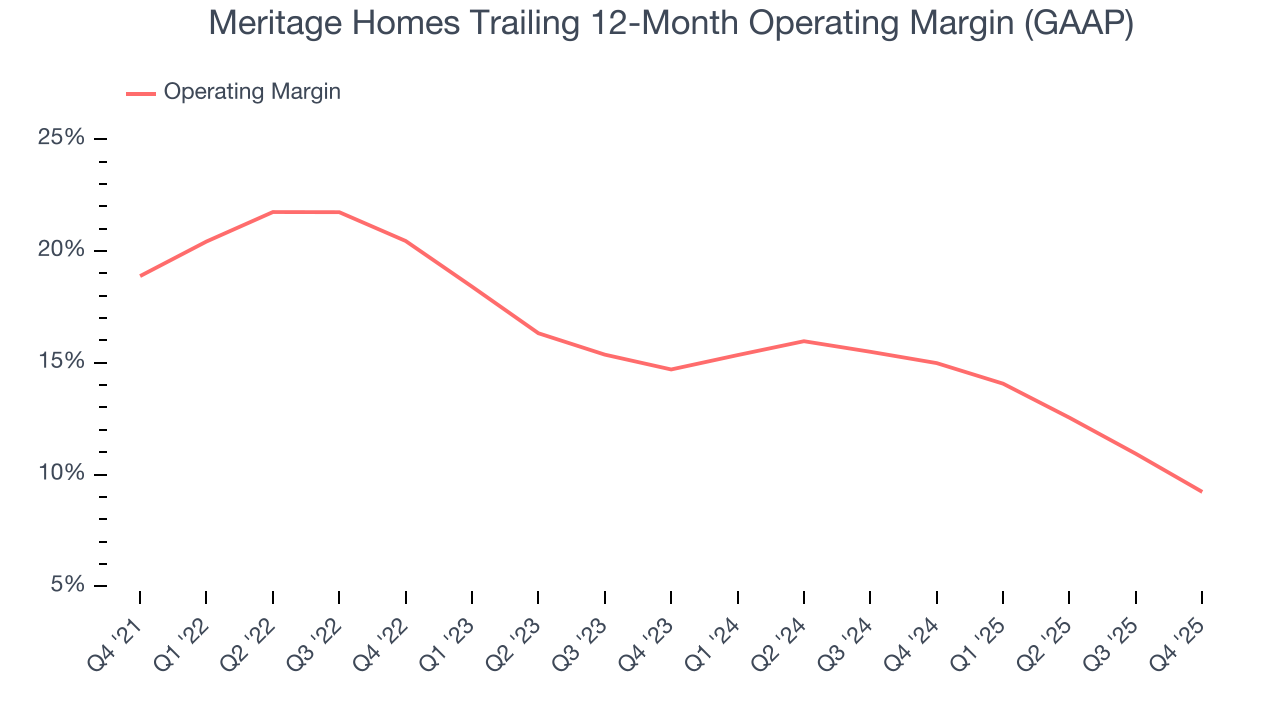
This quarter, Meritage Homes generated an operating margin profit margin of 6.1%, down 6.7 percentage points year on year. Since Meritage Homes’s gross margin decreased more than its operating margin, we can assume its recent inefficiencies were driven more by weaker leverage on its cost of sales rather than increased marketing, R&D, and administrative overhead expenses.
8. Earnings Per Share
Revenue trends explain a company’s historical growth, but the long-term change in earnings per share (EPS) points to the profitability of that growth – for example, a company could inflate its sales through excessive spending on advertising and promotions.
Meritage Homes’s EPS grew at a weak 3.3% compounded annual growth rate over the last five years, lower than its 5.4% annualized revenue growth. This tells us the company became less profitable on a per-share basis as it expanded due to non-fundamental factors such as interest expenses and taxes.

Diving into the nuances of Meritage Homes’s earnings can give us a better understanding of its performance. As we mentioned earlier, Meritage Homes’s operating margin declined by 9.7 percentage points over the last five years. This was the most relevant factor (aside from the revenue impact) behind its lower earnings; interest expenses and taxes can also affect EPS but don’t tell us as much about a company’s fundamentals.
Like with revenue, we analyze EPS over a shorter period to see if we are missing a change in the business.
For Meritage Homes, its two-year annual EPS declines of 19.3% show it’s continued to underperform. These results were bad no matter how you slice the data.
In Q4, Meritage Homes reported adjusted EPS of $1.20, down from $4.72 in the same quarter last year. This print missed analysts’ estimates. Over the next 12 months, Wall Street expects Meritage Homes’s full-year EPS of $6.48 to stay about the same.
9. Cash Is King
If you’ve followed StockStory for a while, you know we emphasize free cash flow. Why, you ask? We believe that in the end, cash is king, and you can’t use accounting profits to pay the bills.
Meritage Homes has shown poor cash profitability over the last five years, giving the company limited opportunities to return capital to shareholders. Its free cash flow margin averaged 1.2%, lousy for an industrials business. The divergence from its good operating margin stems from its capital-intensive business model, which requires Meritage Homes to make large cash investments in working capital and capital expenditures.
Taking a step back, an encouraging sign is that Meritage Homes’s margin expanded by 5 percentage points during that time. The company’s improvement shows it’s heading in the right direction, and we can see it became a less capital-intensive business because its free cash flow profitability rose while its operating profitability fell.

Meritage Homes’s free cash flow clocked in at $238.2 million in Q4, equivalent to a 16.6% margin. Its cash flow turned positive after being negative in the same quarter last year, building on its favorable historical trend.
10. Return on Invested Capital (ROIC)
EPS and free cash flow tell us whether a company was profitable while growing its revenue. But was it capital-efficient? Enter ROIC, a metric showing how much operating profit a company generates relative to the money it has raised (debt and equity).
Although Meritage Homes hasn’t been the highest-quality company lately because of its poor bottom-line (EPS) performance, it historically found a few growth initiatives that worked out well. Its five-year average ROIC was 16.4%, impressive for an industrials business.

We like to invest in businesses with high returns, but the trend in a company’s ROIC is what often surprises the market and moves the stock price. Over the last few years, Meritage Homes’s ROIC has unfortunately decreased significantly. We like what management has done in the past, but its declining returns are perhaps a symptom of fewer profitable growth opportunities.
11. Balance Sheet Assessment
Meritage Homes reported $775.2 million of cash and $3.63 billion of debt on its balance sheet in the most recent quarter. As investors in high-quality companies, we primarily focus on two things: 1) that a company’s debt level isn’t too high and 2) that its interest payments are not excessively burdening the business.
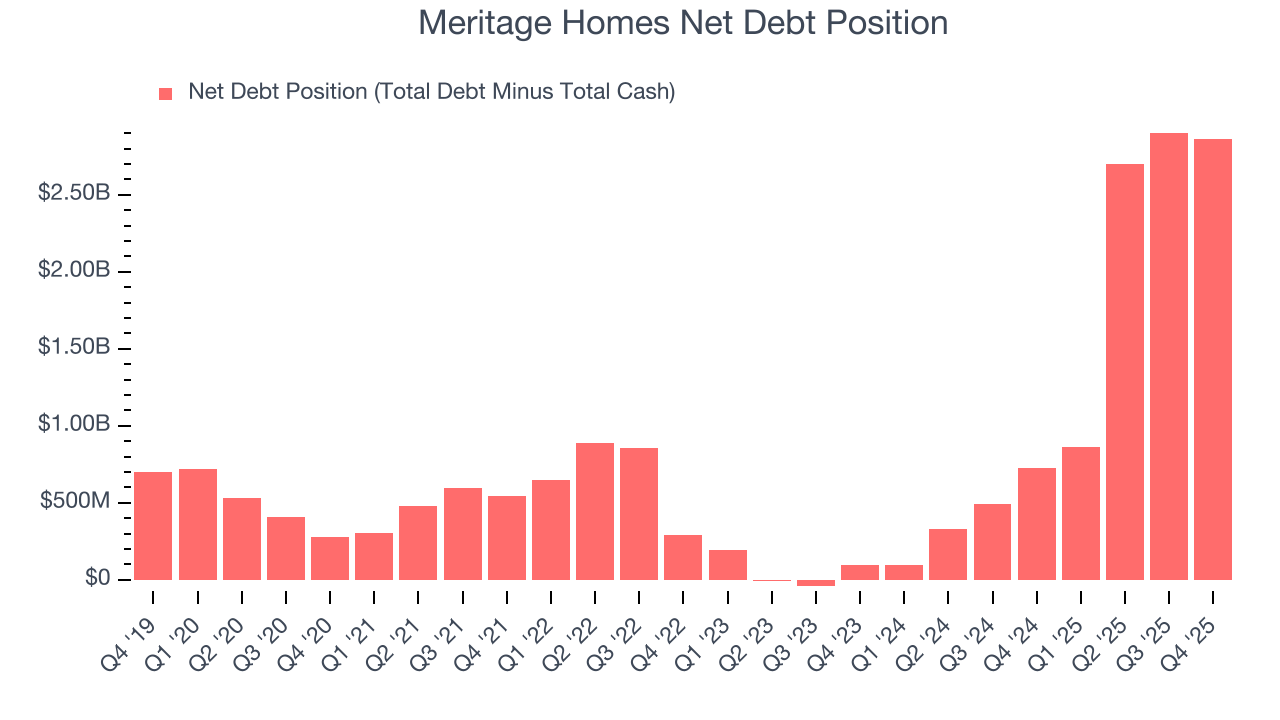
With $606.9 million of EBITDA over the last 12 months, we view Meritage Homes’s 4.7× net-debt-to-EBITDA ratio as safe. The company’s profits give it plenty of breathing room, allowing it to continue investing in growth initiatives.
12. Key Takeaways from Meritage Homes’s Q4 Results
We struggled to find many positives in these results. Its revenue missed and its adjusted operating income fell short of Wall Street’s estimates. Overall, this was a weaker quarter. The stock remained flat at $69.30 immediately following the results.
13. Is Now The Time To Buy Meritage Homes?
Updated: March 3, 2026 at 11:01 PM EST
The latest quarterly earnings matters, sure, but we actually think longer-term fundamentals and valuation matter more. Investors should consider all these pieces before deciding whether or not to invest in Meritage Homes.
Meritage Homes falls short of our quality standards. To begin with, its revenue growth was uninspiring over the last five years, and analysts expect its demand to deteriorate over the next 12 months. While its backlog growth has been marvelous, the downside is its diminishing returns show management's prior bets haven't worked out. On top of that, its projected EPS for the next year is lacking.
Meritage Homes’s P/E ratio based on the next 12 months is 12.3x. While this valuation is fair, the upside isn’t great compared to the potential downside. There are better stocks to buy right now.
Wall Street analysts have a consensus one-year price target of $83 on the company (compared to the current share price of $72.08).
Although the price target is bullish, readers should exercise caution because analysts tend to be overly optimistic. The firms they work for, often big banks, have relationships with companies that extend into fundraising, M&A advisory, and other rewarding business lines. As a result, they typically hesitate to say bad things for fear they will lose out. We at StockStory do not suffer from such conflicts of interest, so we’ll always tell it like it is.

